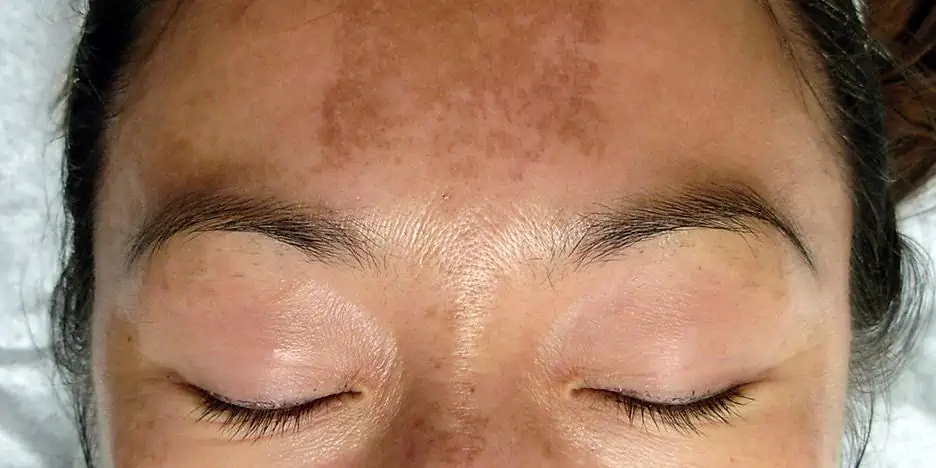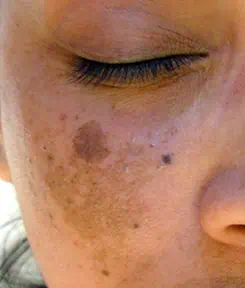
OC 949-428-4500
LA 310-460-2444

This skin problem is particularly prominent during pregnancy and is commonly referred to as the “pregnancy mask”. The pregnancy hormones are one of the main causes of melasma.
Some women are so sensitive to hormonal changes, that going on the birth control pill or even changing brands of birth control pills can exacerbate their melasma.
Melasma is also more common in people with darker skin including people of North African, African-American, Middle Eastern, Latin or Hispanic decent. The said skin condition can be genetic.
Melasma does not cause people to feel any different. The most common complaint about this condition is in regards to the appearance of the skin.
Pregnancy melasma is known in the medical field as Chloasma, but commonly referred to as the “pregnancy mask”. During the final two stages of pregnancy expecting mothers face an increase in hormones such as estrogen, melanocyte-stimulating hormones and progesterone. Researchers believe the “pregnancy mask” is caused by the boost in progesterone not the melanocyte-stimulating hormone.
In addition, menopausal women who used hormone replacements with progesterone were prone to melasma while those who used estrogen were less likely to have the dark spots on their skin.
Melasma appears in three distinct patterns on the face.
Perhaps the best way to treat melasma is with prevention. Sun protection, such as sunscreen, is the best defense against this skin problem. Experts recommend applying sunscreen on a daily basis. If sun exposure is extreme, sunscreen should be applied every 2 hours to prevent against the dark spots of melasma. However, sunscreen alone may not completely prevent against the severe sun damage. Visit your skincare specialist for stronger treatments.
It is not uncommon for melasma to naturally clear without any form of treatment. Many patients report a decrease in the spots after simply avoiding the sun. Others, who have hormonal melasma, report that their symptoms relinquished after the birth of their child or they stopped taking hormone therapies.Hydroquinone creams, such as Estoerica or Porcelana, can be purchased over-the-counter if they contain 2 percent hydroquinone. If the cream contains 4 percent hydroquinone, such as Obagi Clear and Solaquin, a prescription is required. Research indicates that even the over-the-counter products can effectively lighten the dark spots of melasma when applied twice a day.
In addition to the cream, sunscreen should be applied daily to prevent against future melasma outbreaks. The over-the-counter products have also proven to be less irritating to the skin. The epidermal type of melasma responds best to these types of creams as it is primarily found on the surface of the dermis.A combination of creams and lotions containing hydroquinone, azelaic acid, a phenolic hypopigmenting agent and retinoic acids are used in treating melasma.
In severe cases doctors may prescribe higher doses of hydroquinone with a form of acid in order to reduce the appearance of melasma. These acids include: azelaic, retinoic, tazarotene, adapalene, kojic, lactic and glycolic.Laser treatments are also used to treat melasma. These procedures should be used with caution as they can worsen the dark spots on skin if done incorrectly. Multiple treatments are often required in order to see dramatic results.
Like any melasma treatment, it is best to continue a daily sunscreen regimen to ensure the best results.By far the most effective laser treatments for melasma will be treatments combined with topical creams, and anything else that helps reduce the production of melanin.
There are a number of different kinds of lasers that work in reducing melasma. A real laser specialist might even combine different kinds of lasers to customize the most effective treatment specifically for your skin.Doctors Alice Pien, MD and Asher Milgrom, Phd are established pioneers in the fields of Regenerative Medicine and Skincare. Their expertise ranges from advanced laser systems to HCT/P – Stem Cell medicine. Their medical education and advanced certifications span from medical schools of NY State University, the University of Chicago, to Johns Hopkins, Harvard and UCLA. They approach medicine with the clinical expertise of over 85,000 successful treatments over the past 20 years and significant scientific research resulting in proprietary protocols that they customize for each individual patient.
AMA Regenerative Medicine & Skincare | 1570 Brookhollow Dr., Santa Ana, CA 92705 | 6310 San Vicente Blvd STE 285, Los Angeles, CA, 90048 | Privacy Policy